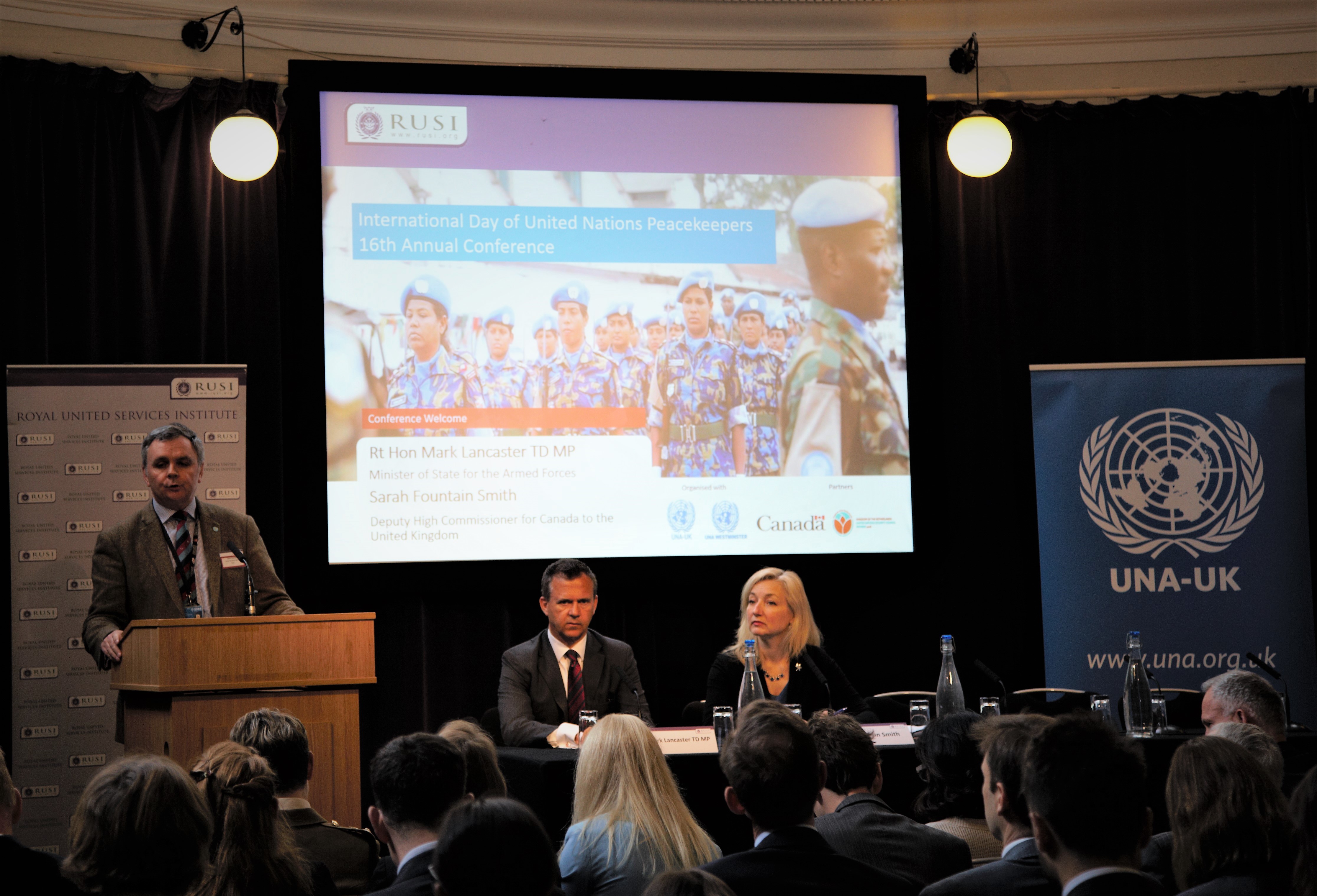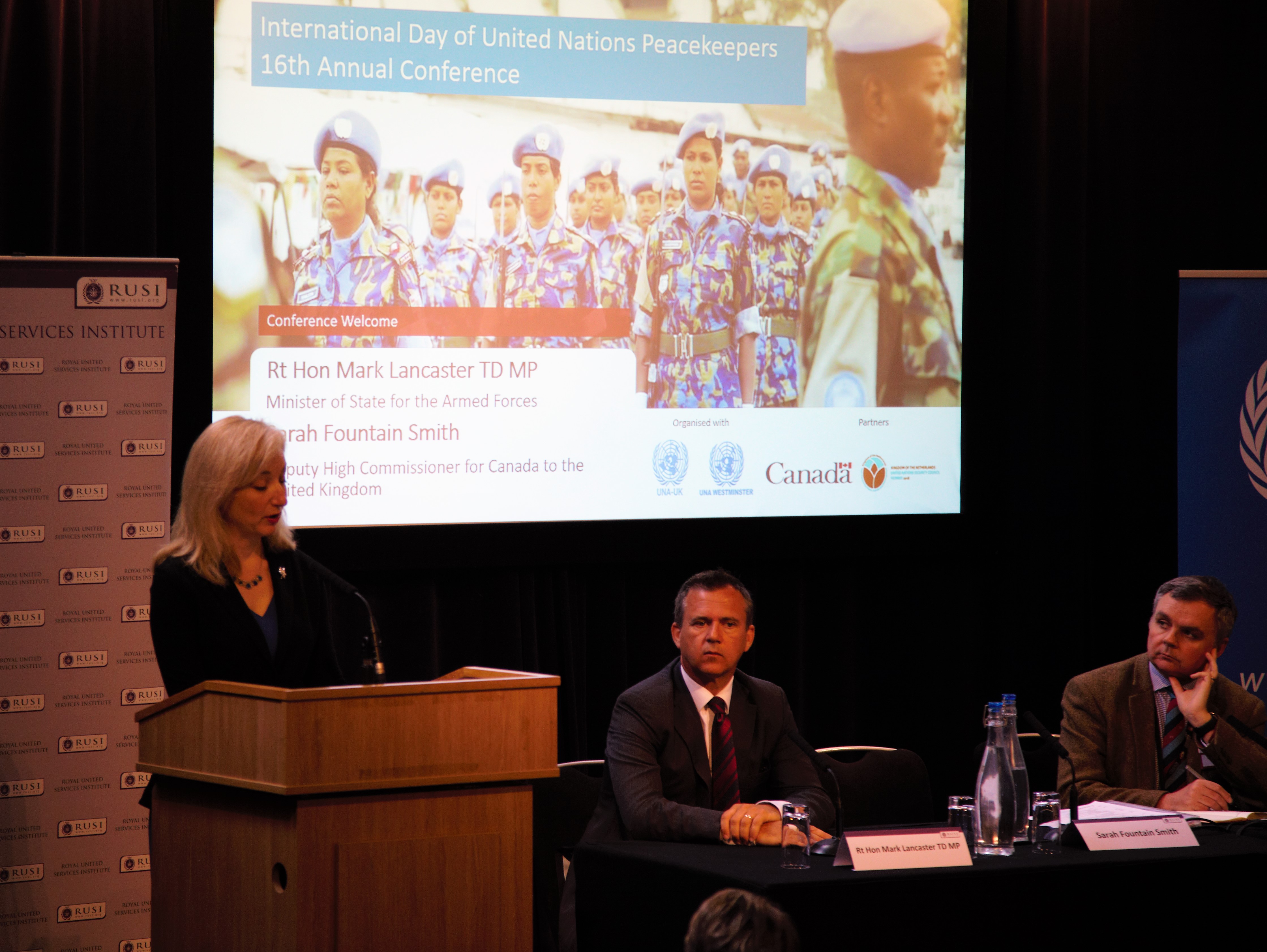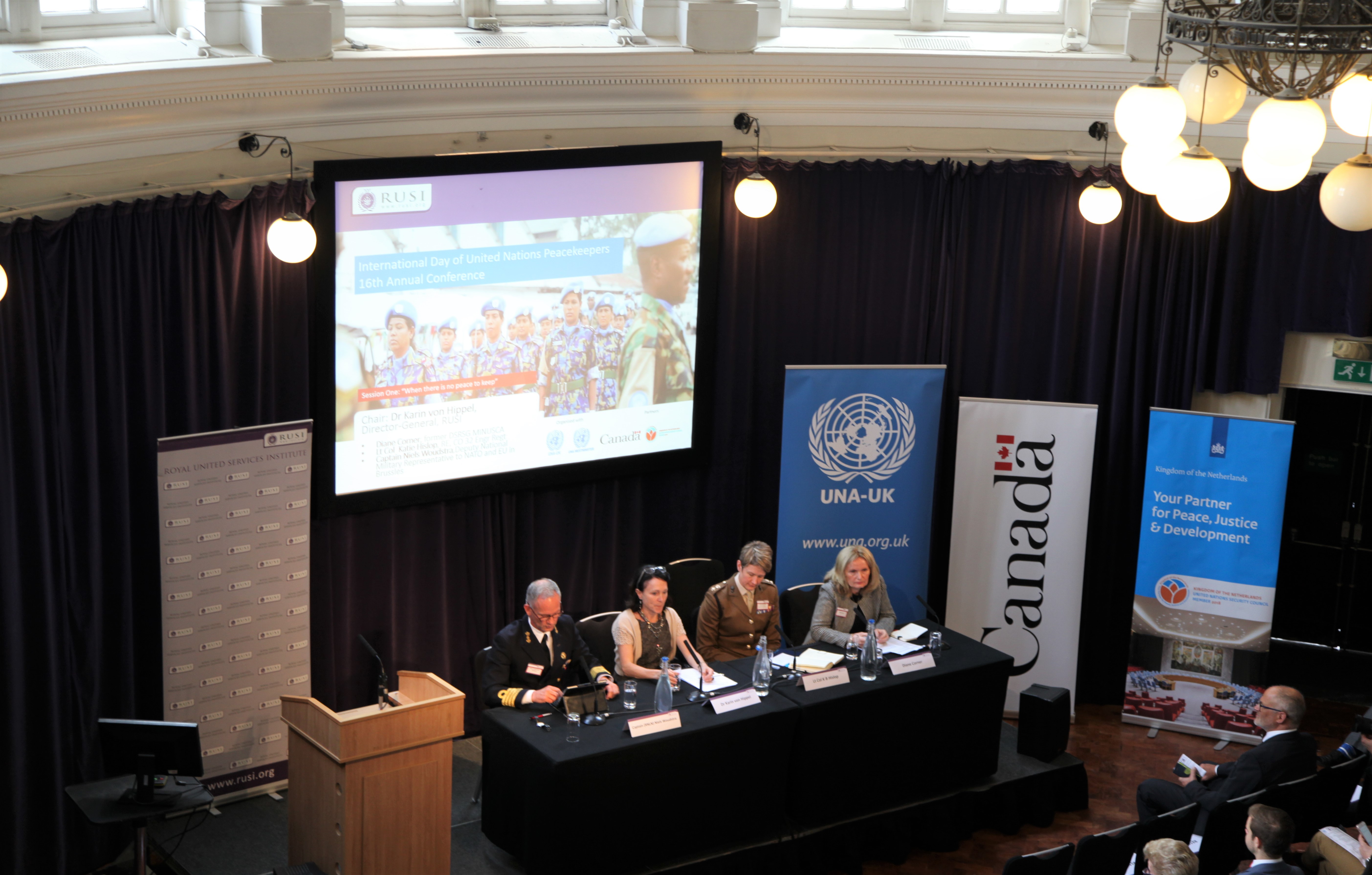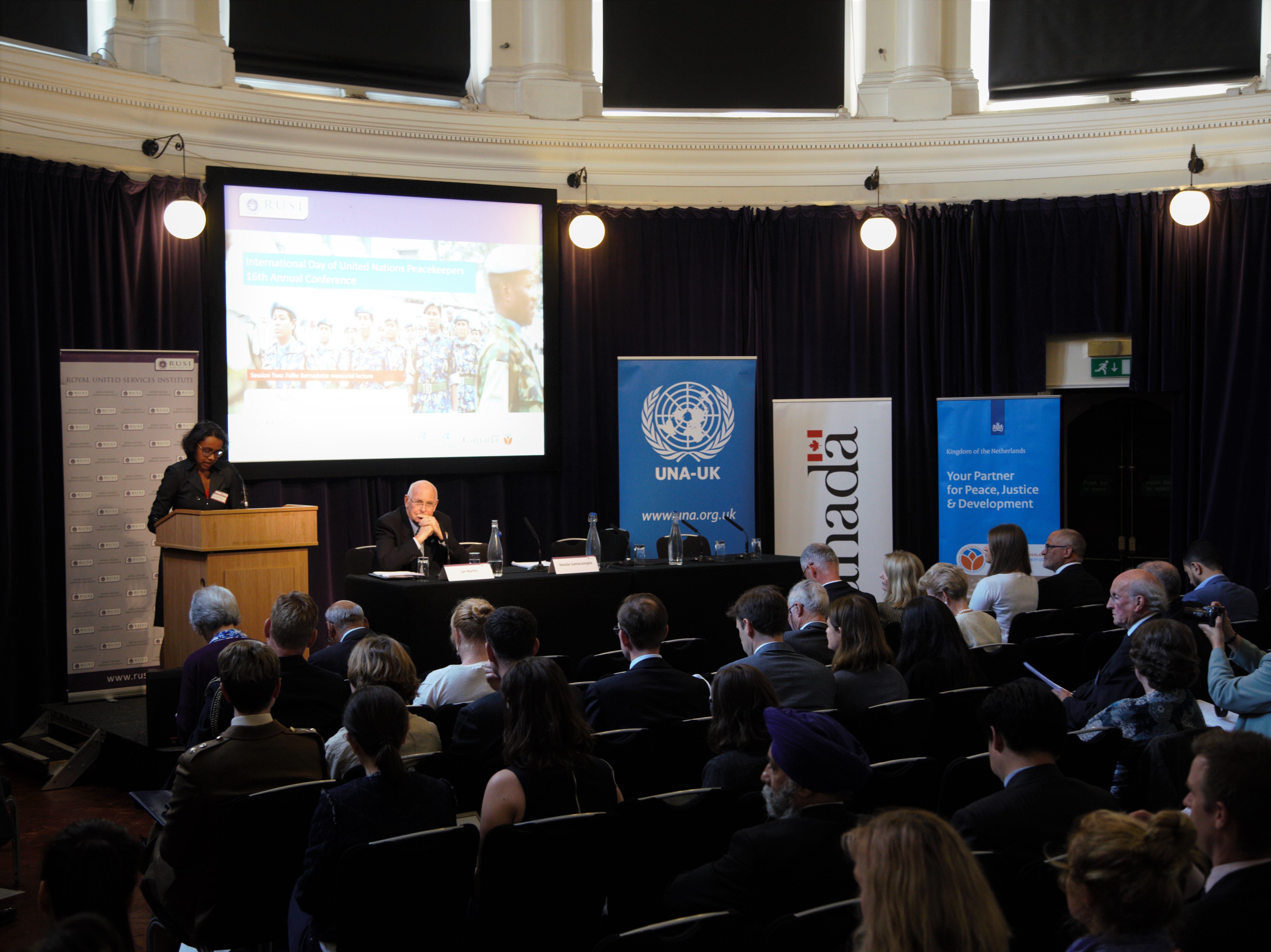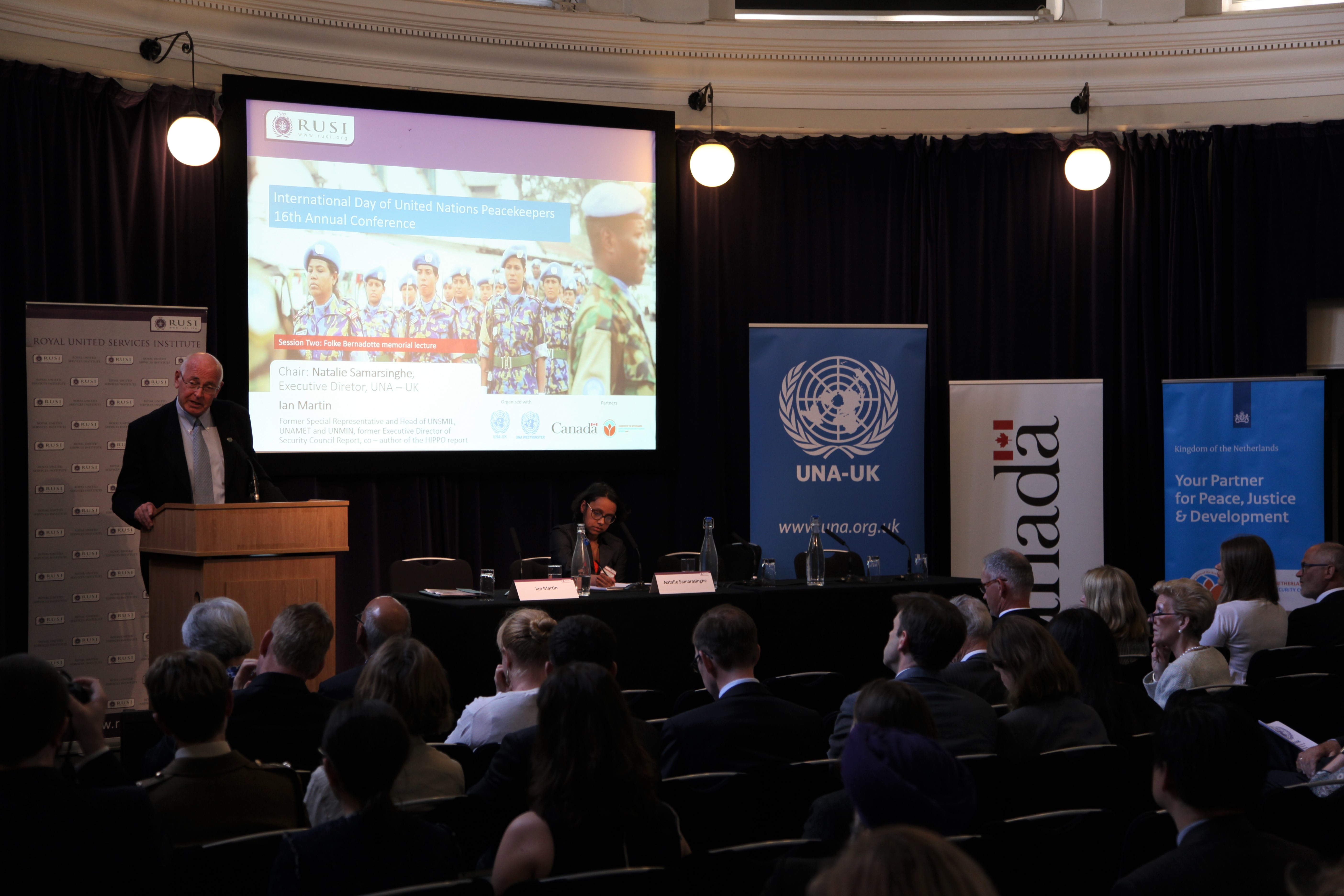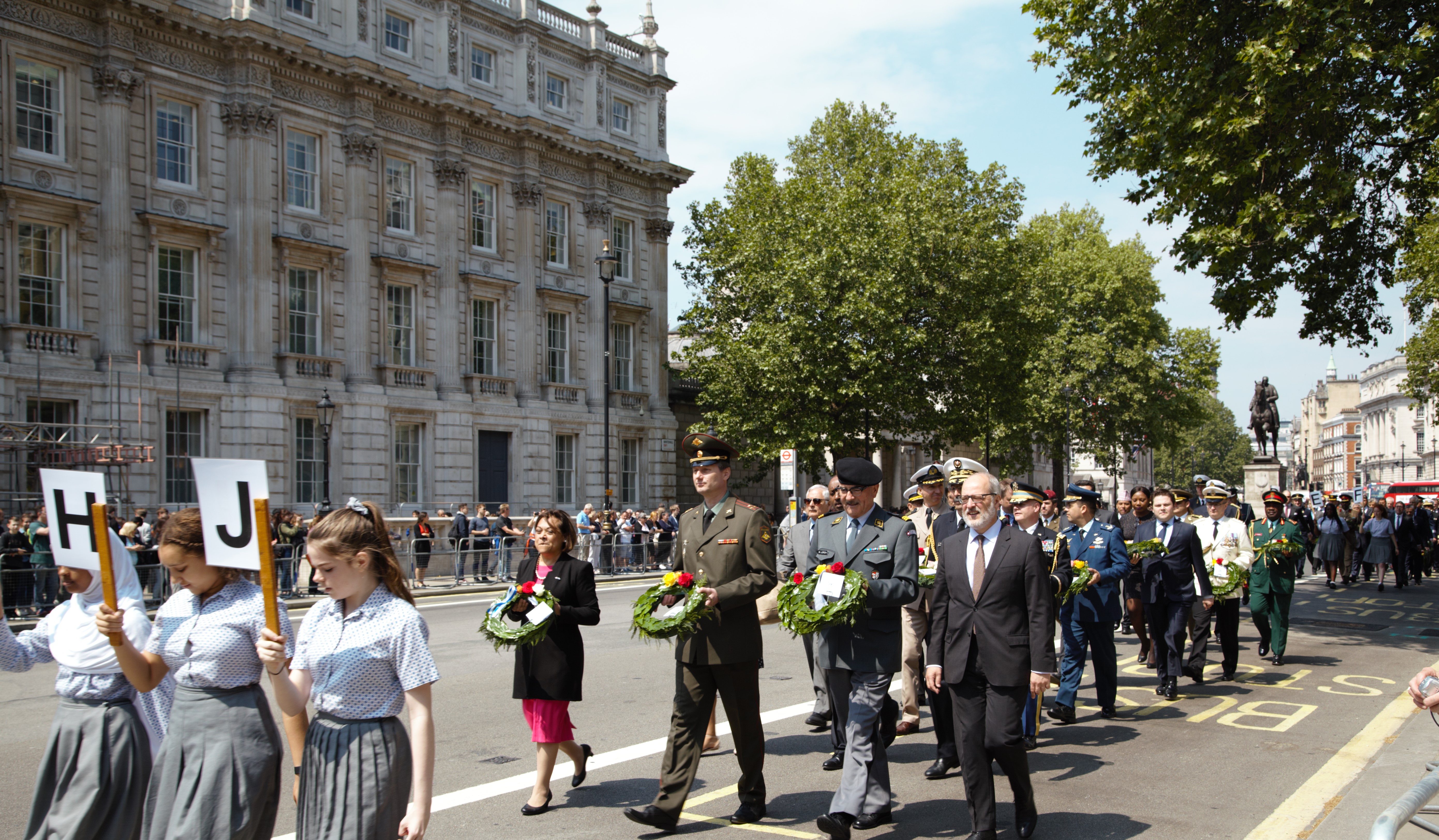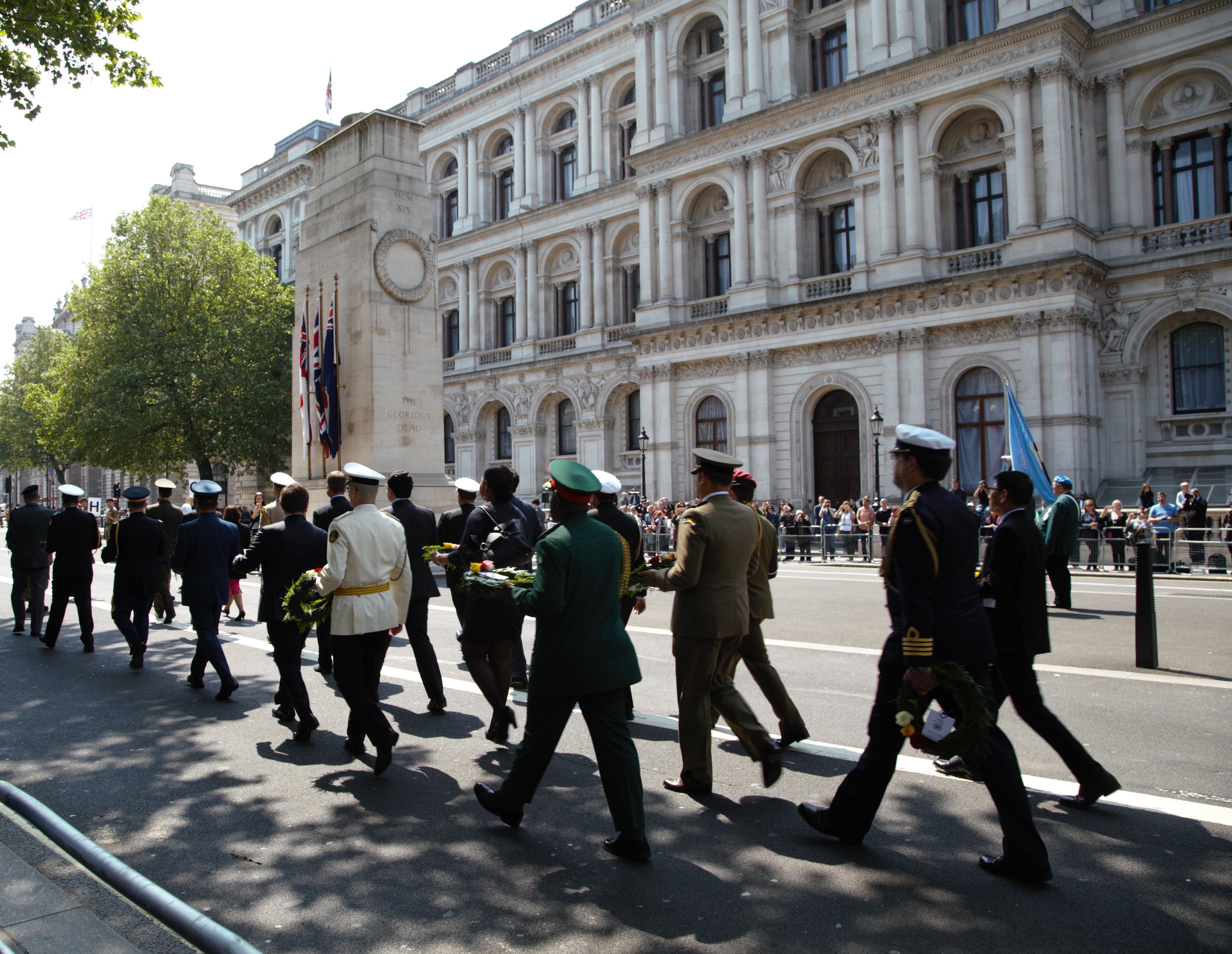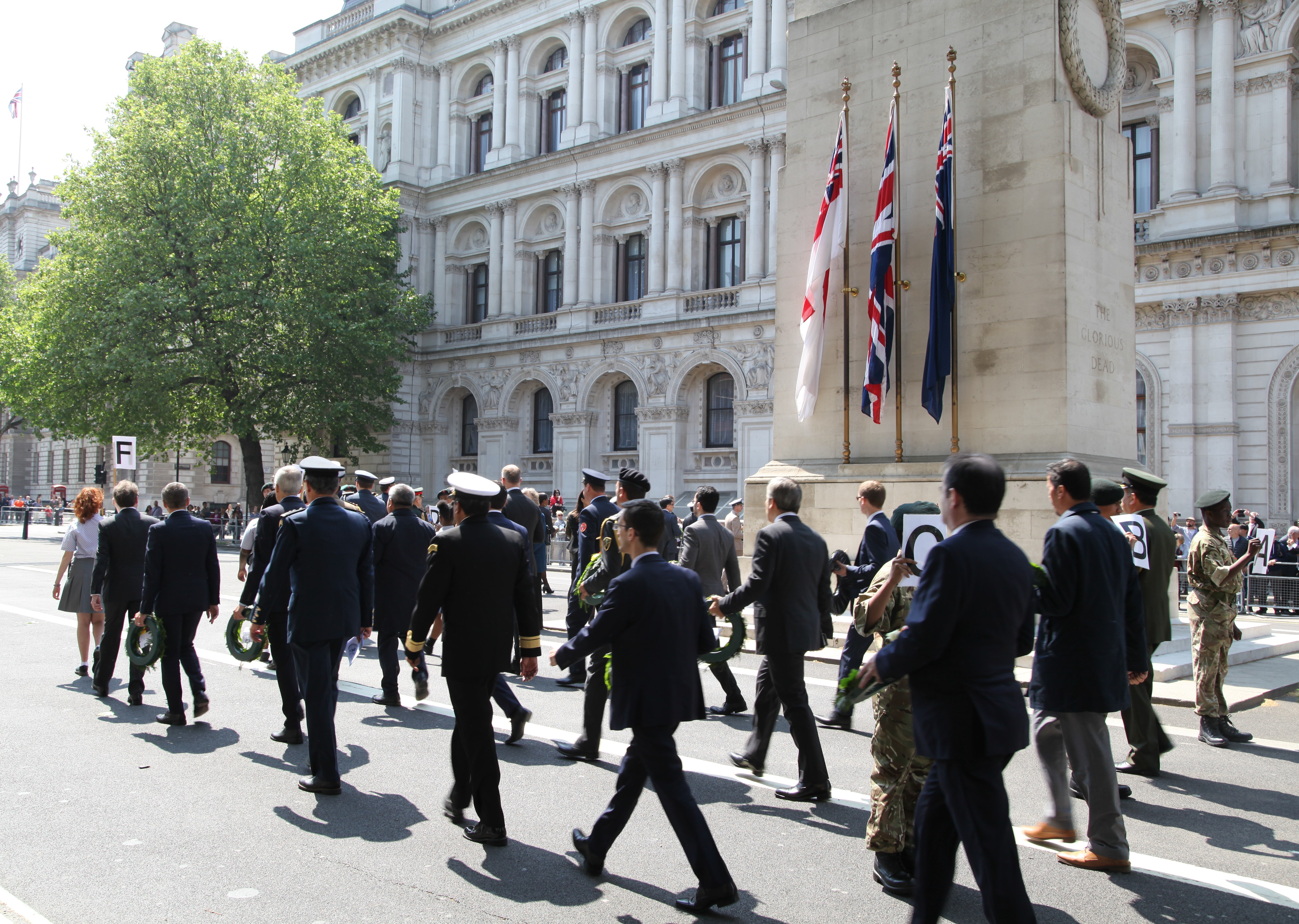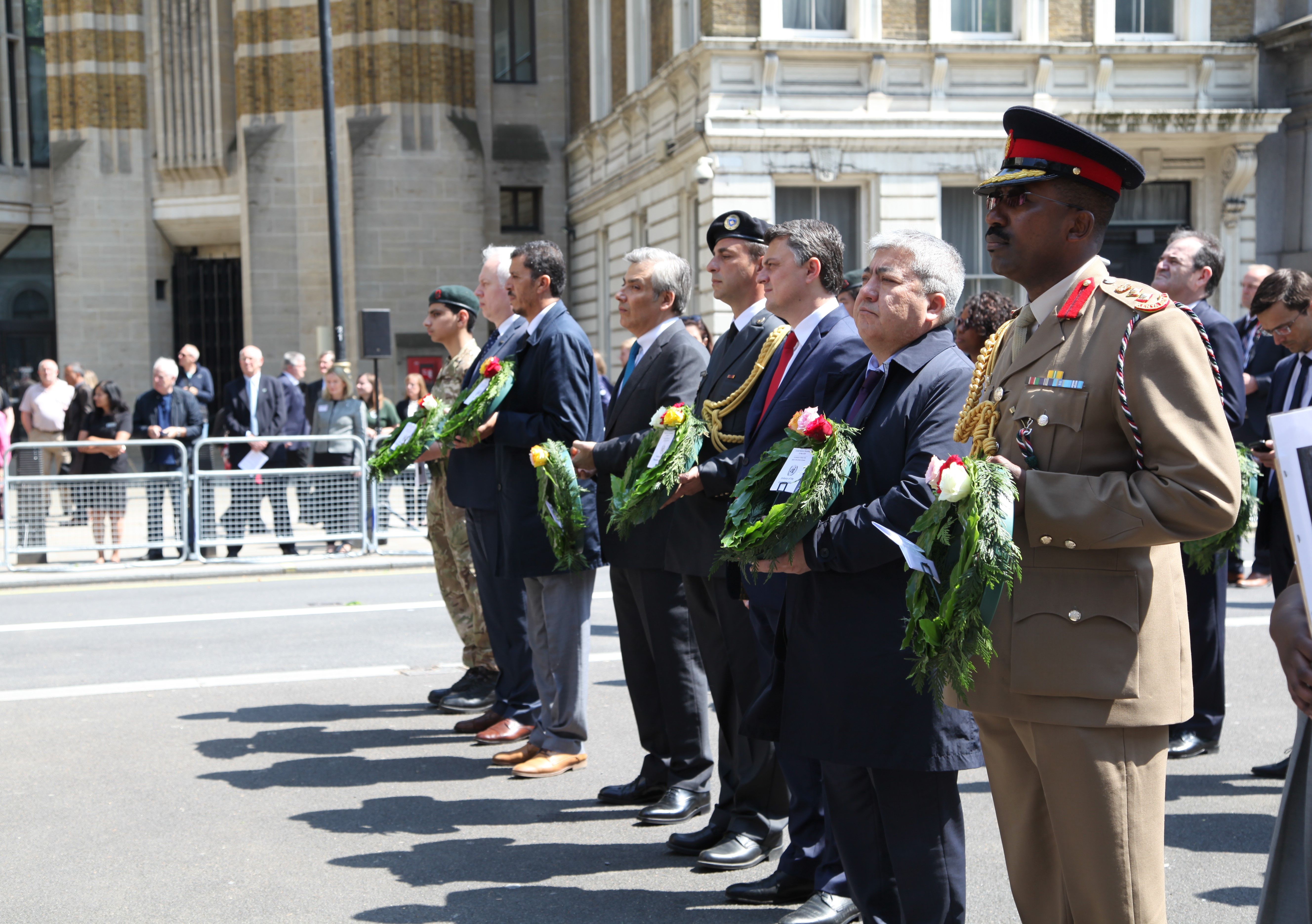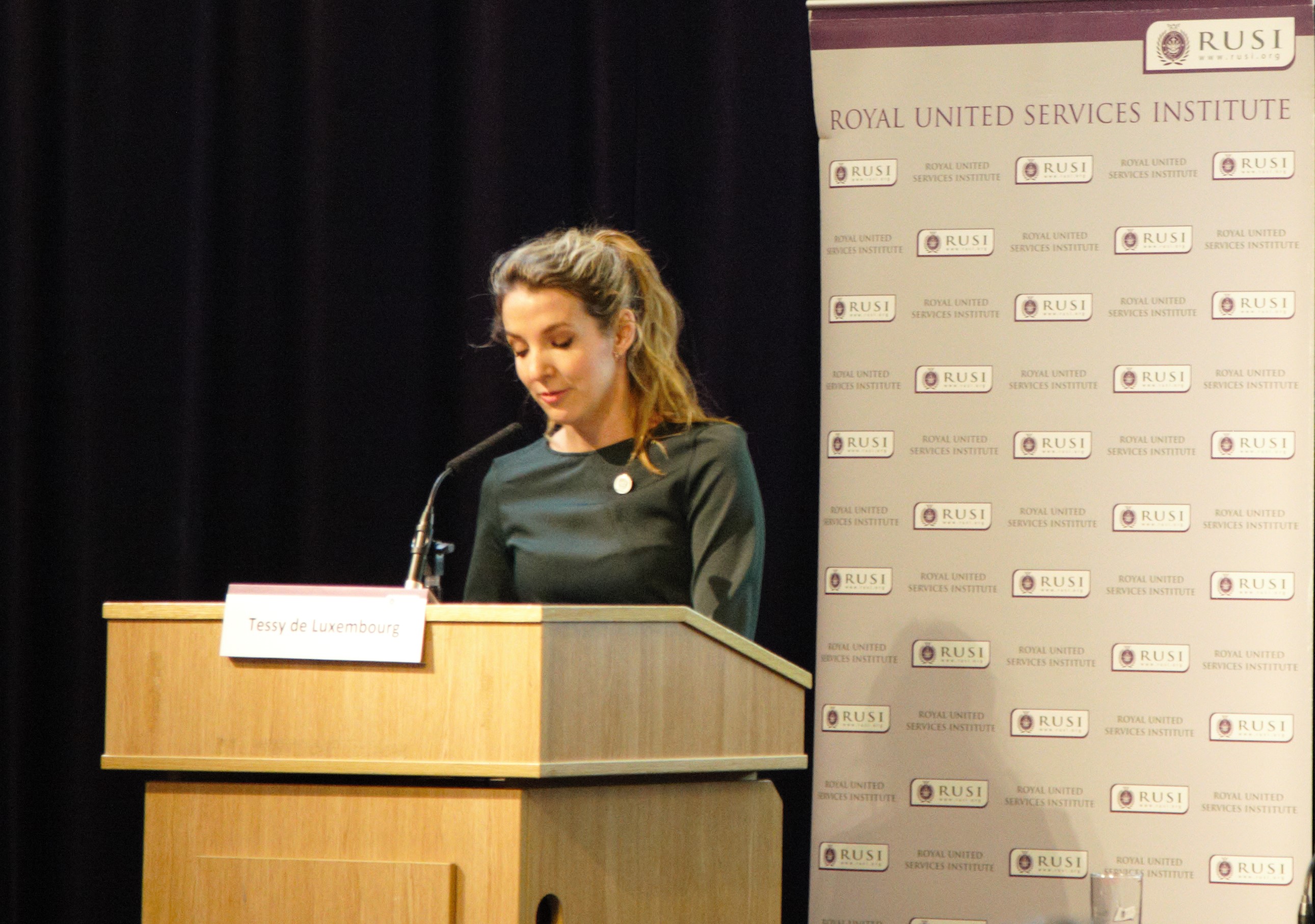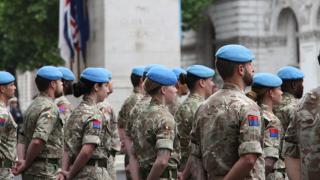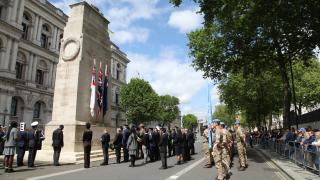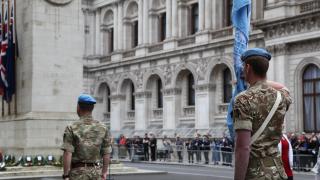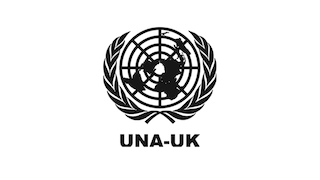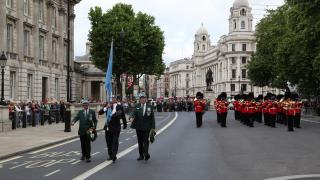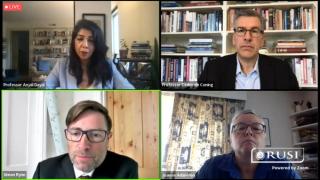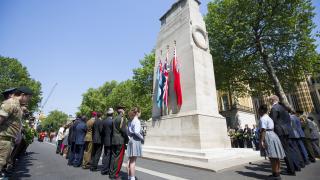
To mark the 70th anniversary of the establishment of the first UN peacekeeping mission, a memorial ceremony and conference were held by UNA-UK in partnership with UNA-Westminster and the Royal United Services Institute (RUSI). This was the biggest such occasion in Europe, if not worldwide.
The memorial ceremony took place at 1330 on 23 May 2018. It was part of a day-long conference in which 140 experts and practitioners heard a number of presentations including one from Ian Martin, former Special Representative and Head of the United Nations missions in three countries, and member of the UN’s High-Level Independent Panel on Peace Operations (HIPPO) 2014-15. Mr Martin discussed UN peacekeeping, dynamics of the UN Security Council and efforts to combat sexual exploitation and abuse.
Ian Martin highlighted the severity of the task facing UN Peacekeeping, stating that,
This day of commemoration takes place at a time when there are recent successes of UN peace operations to celebrate. Côte d’Ivoire and Liberia, where missions have now closed, would not have emerged from their nightmares without their years of UN peacekeeping. I take personal pleasure in witnessing peaceful political transitions being accomplished by the national actors after UN peace operations in Timor-Leste and Nepal. But we also have to acknowledge that today four of the UN’s largest missions – in Mali, the Democratic Republic of the Congo, the Central African Republic and South Sudan, are facing grave difficulties.”
Mr Martin's speech was the highlight of a full day of events.
Ewan Lawson, Senior Research Fellow, RUSI, opened the conference introducing welcomes from Mark Lancaster MP, Minister of State for the Army, and Sarah Fountain Smith, Canada’s Deputy High Commissioner. They highlighted UN peacekeeping’s importance and the Deputy High Commissioner noted Canada’s ‘Elsie initiative’ on women peace operations.
The first session was entitled “When there is no peace to keep” and looked at what ‘robust peacekeeping’ really means and the increasing hostility missions have faced, particularly in sub Saharan Africa. Chaired by Dr Karin von Hippel, Director-General of RUSI, it featured Diane Corner, former Deputy Head of Mission and Special Representative of the Secretary General in the Central African Republic (MINUSCA); Lt Col K B Hislop RE, Commander of the UK's deployment to South Sudan (UNMISS) and Captain (RNLN) Niels Woudstra, former Commanding Officer of the Dutch Contingent in Mali (MINUSMA) and current Deputy National Military Representative to NATO and EU in Brussels.
Captain Woudstra provided an insight of peacekeepers’ daily duties in Mali stating that 90% of the activity in this mission was in self defence. Lt Col Hislop shared her experience in South Sudan talking about the importance of contingents working together, highlighting in particular the support her contingent received from Indian engineering units and the Rwandan and Mongolian troops who provided protection. Diane Corner gave a powerful presentation on her experiences in the Central African Republic and the Democratic Republic of Congo. She highlighted the importance of small contingents, which can have a considerable impact on standards and morale.
The second session was the Folke Bernadotte Memorial Lecture. Natalie Samarasinghe, Executive Director, UNA-UK chaired the session and reminded the audience of the legacy of Count Folke Bernadotte, a UN mediator in Palestine, who was assassinated in Jerusalem in 1948, becoming the first member of United Nations Staff to be killed in the line of duty. Ms Samarasinghe then introduced the keynote speaker Ian Martin.
Mr Martin started by talking about the Report of the High-Level Independent Panel on Peace Operations (HIPPO) on which he served, and the argument it made for the primacy of politics:
We argued for an emphasis on conflict prevention and early engagement, to avert the need for military deployments wherever possible – a priority that has been strongly embraced by Secretary-General Guterres
He then talked about the Secretary-General's overhaul of peace and security architecture, and the Secretary-General's plan to end the artificial seperation of peacekeeping and political missions, saying:
This conceptual, managerial and budgetary bifurcation has been seriously dysfunctional, especially where flexible transitions are needed to respond to changes in country situations. HIPPO therefore recommended moving away from this distinction, and that we think in terms not of two types of UN missions, but of a spectrum of peace operations
He also voiced his strong criticism of the absence of strategic discussion and meaningful consultation at the UN Security-Council, saying:
The current process is over-dependent on three so-called penholders – France, the UK and the US, often referred to as the Council’s P3 - which have arrogated to themselves the lead on almost all country situations on the Council’s agenda. France is the post-colonial penholder for francophone countries, as well as providing five French diplomats in a row to head the Department of Peacekeeping Operations for the twenty years since it was promised this when it lifted its veto on Kofi Annan’s election as Secretary-General. The UK’s penholderships include Colombia, Cyprus, Libya, Somalia and Yemen; the last of these is particularly inappropriate in view of the UK’s support for the Saudi-Arabian-led coalition, which has contributed to the Council’s lack of effective action in the face of the worst humanitarian crisis in the world. While the P3 consult among themselves and ensure that Russia and China will not veto their drafts, the Council as a whole engages in hardly any frank strategic discussion before its elected majority are given little time to go along with the penholder’s proposals."
In conclusion he called for the UK to deepen its engagement with peacekeeping, saying:
HIPPO only partly had its tongue in cheek when we said that the Panel “deems it particularly important that the forces of permanent members of the Security Council participate in UN peacekeeping operations.” It would, we said, put the parties to the conflict on notice that the Council is ready to invest in the settlement of the conflict, and could make a difference in the quality of policy deliberations in New York as much as it could affect effectiveness in the field. The UK’s 704 troops (321 of them in South Sudan and 249 in Cyprus), 32 staff officers and 4 military experts do not constitute the commitment that should be made by a permanent member with our military capability. A small number of British police officers made a fine contribution to the mission I headed in East Timor: today there are zero UK police serving in UN peacekeeping.
A video of Mr Martin’s speech will be made available shortly.
Following these sessions was a memorial wreath laying ceremony. The band of the Welsh Guards, veterans of the UN Veteran Association, 14 VIPs (including Tessy Antony, Princess of Luxembourg, Lord Ahmad Minister of State for the UN - accompanied by Harriet Baldwin MP, Minister of State for Africa, and Air Vice-Marshal Alison Mardell, Director of RAF Legal Services) and the ambassadors, defence attaches and representatives of 110 different Embassies and High Commissions marched to the Cenotaph where they laid wreaths to remember peacekeepers who have fallen in duty.
After lunch, the inaugural Margaret Anstee Memorial Seminar was held. Emma Fanning reflected on the life of Dame Margaret, the first woman to lead a peacekeeping mission and the first woman to reach the rank of UN Under Secretary-General.
The session then considered the topic: “Future peacekeeping” and the search for capacity – a discussion of how the gap between expectations and resourcing can be met, particularly in the context of budget cuts and changes to the UN’s peace and security architecture. The session featured Chandrima Das, Director of the United Nations Foundation; Capt (N) David Mazur, Director Strategic Plans (DSP), Canadian Armed Forces Strategic Joint Staff; Sophia Willitts-Kings, Head UN Peacekeeping Joint Unit and Deputy Head UN and Multilateral Unit, Foreign and Commonwealth Office and Professor David Curran, University of Coventry.
Chandrima Das layed out the scale of the resource threat to peacekeeping caused by the United States budget cuts. Captain David Mazur discussed Canada’s long history in peacekeeping and its current commitments to peacekeeping. He discussed how Canada is currently investigating ways of increasing its commitment to peacekeeping, including the provision of helicopters in Mali and rapid global airlift ability. Sophia Willitts-Kings explained the rationale for the UK's increased contribution to peacekeeping which plays "a vital role at a fair price". Finally, David Curran focused on the question of expectations and whether, in prioritizing them, we give enough thought to the expectations of the "peace kept".
The conference was then brought to a close by David Wardrop of UNA-Westminster and Tessy Antony, Princess of Luxembourg and a UNA patron. A former peacekeeper herself, Tessy thanked all the participants and our generous sponsors: the High Commission of Canada and the Embassy of the Netherlands. She summarised the day’s proceedings with some pertinent observations on the value and importance of women peackeeepers.
Photo: UNA Peacekeepers' day 2018 credit: Owen Cooban, Ministry of Defence
Further photos from the day:

